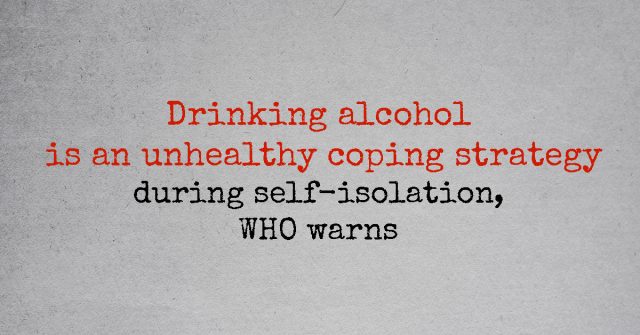The World Health Organization has urged people to refrain from indulging in substance abuse by warning them that alcohol is by far the worst possible coping mechanism for dealing with anxiety and stress in times like these.
A new survey that was conducted suggested that the Coronavirus pandemic has caused almost two-thirds of UK citizens to feel worried and anxious.
But while experts from WHO acknowledge that feeling stressed, fearful, lonely, anxious or depressed is a normal thing during crises such as this, they strongly advise that drinking alcohol is an “unhelpful coping strategy” for lockdown.
This warning has been issued after off-licenses were added to the Government’s list of UK retailers allowed to stay open during the coronavirus pandemic which ultimately resulted in a drastic increase in the number of people who turned to drugs and alcohol after announcing the lockdown.
Dr. Aiysha Malik, a technical officer for the WHO’s department of mental health, said: “For people without addictions, using substances will not help to manage the stress of self-isolation. They can make things worse.”
She said that in difficult and stressful times like these, the most important thing that we can do is focus on taking care of both our mental and physical wellbeing. That includes incorporating healthy eating habits into our everyday life, exercising more often, improving our sleep quality and asking for help when life gets overwhelmingly difficult.
Dr. Malik added: “When we’re staying at home routines are very important for creating a sense of structure. Minimizing the unhelpful coping strategies of using tobacco or alcohol can also be important for wellbeing and minimizing content you might find distressing in the news.”
WHO has also advised that mental health services should prepare for a rapid increase in the number of people who will be in need of help and guidance as a result of the current pandemic.
The truth is, social distancing and quarantine measures are now keeping people away from doing what they want to do, where they want to be and who they want to be with. We’re trapped inside our own homes hoping that pretty soon all of this will end. But we don’t know when exactly is that going to happen. That alone can have a really big impact on our mental health.
Furthermore, it is also very important to urge people to stop referring to the elderly as a part of the vulnerable group, since this could induce even more fear, anxiety, and stress in the population and eventually lead to spreading even more panic.
“The psychological impact for older adults can include anxiety, feeling stressed or angry, and its impact can be particularly difficult for older adults who might have a cognitive decline or dementia. Some older adults may have already been socially isolated before this and feel lonely which can worsen mental health.”
Dr. Malik also said that to protect their mental health during the isolation period, people can take part in physical activity, stick to their old routines, or even better engage in new ones that they’ve been looking forward to for a long time. All in all, these routines should give people a sense of achievement and inspire them to focus on finding themselves.
The previously mentioned survey that has was carried out before the full lockdown was announced found that out of 2,000 UK adults who were a part of the poll, 62% felt anxious and worried as a result of the Coronavirus pandemic, 22% felt panic and 3 people in 10 felt afraid.
Mental Health Foundation director of research Dr Antonis Kousoulis said: “This poll was carried out before full lockdown was introduced. Even then there were clear indications that the pandemic was beginning to have a significant impact on the nation’s mental health.”
If you know someone who is struggling to get through these hard times, here’s a list of all the organizations that are providing support for those in need right now. Don’t hesitate to ask for help.
Source: Independent UK


